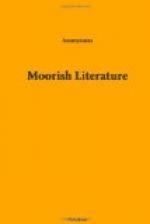“Thou
call’st
Thyself a Sunnite, yet thou knowest not
The three great things their Author gave
to us:
(He knows all secrets.) First is Paradise,
Then the Koran, and then our Prophet great,
Destroyer of false faiths and for all
men
The interceder. Whosoe’er loves
him
Doth love the Arabs, too, and cleaves
to them.
And whosoe’er hates them hates,
too, in truth,
The chosen one of God. Thou hatest
him,
For thou revil’st my ancestors,
and seek’st
To lower their rank and vilify their fame.
Think on thine evil deeds, against the
day
When in thy grave thou’lt lie, and
that one, too,
When thou shalt rise again, insulter of
The Arabs, king of peoples on the earth.”
“The Arabs I do not at all despise,”
The city woman said, “nor yet decry
Their honor, and ’tis only on account
Of thee I spoke against them. But
’tis thou
Who hast insulted all my family, and placed
Thy race above. He who begins is
e’er
At fault, and not the one who follows.
Thou
The quarrel didst commence. Pray
God, our Lord,
To pardon me, as I will pray him, too,
And I the Arabs will no more attack.
If they offend me I will pardon them
And like them for our holy prophet’s
sake.
I shall awake in Paradise some day.
From them ’tis given, far beyond
all price.
Frankly, I love them more than I do love
Myself. I love them from my very
heart.
He who a people loveth shall arise
With them. And here’s an end
to all our words
Of bickering and mutual abuse.”
I told them that it was my duty plain
To reconcile them. I accorded both
Of them most pure intentions. Then
I sent
Them home, and made agreeable the way.
Their cares I drove away with honeyed
words.
I have composed the verses of this piece,
With sense more delicate than rare perfume
Of orange-flower or than sugar sweet,
For those kind hearts who know how to
forgive.
As for the evil-minded, they should feel
The zeqqoum. With the flowers
of rhetoric
My song is ornamented: like the breast
Of some fair virgin all bedecked with
stones
Which shine like bright stars in the firmament.
Some of its words will seem severe to
those
Who criticise. I culled them like
unto
A nosegay in the garden of allusions.
May men of lion hearts and spirit keen—
Beloved by God and objects of his care—
Receive my salutations while they live,
My countless salutations.
I
should let
My name be known to him who’s subject
to
The Cherfa and obeys their mighty power.
The mym precedes, then comes the
written ha.
The mym and dal complete
the round and make
It comprehensible to him who reads
Mahomet. May God pardon me this work
So frivolous, and also all my faults
And errors. I place confidence in
him,
Creator of all men, with pardon free
For all our sins, and in his mercy trust,
Because he giveth it to him who seeks.




